| Pages:
1
..
13
14
15
16
17
..
40 |
Endimion17
International Hazard
    
Posts: 1468
Registered: 17-7-2011
Location: shores of a solar sea
Member Is Offline
Mood: speeding through time at the rate of 1 second per second
|
|
Quote: Originally posted by DJF90  | | Because it does. Bromine comes from the greek Bromos, which means stench. At least if I remember correctly. |
So, the argument is essentially: "It smells bad because it's named after the Greek word for stench."
That's a fallacy. 
Bromine does not smell disgusting at all. Irritating, yes. Disgusting and smelly, no. It resemblies other halogens, nitrogen dioxide and ozone, all
being strong oxidizers. Of course, with increasing concentration in unit volume of air, it gets more and more irritating, until it becomes agonizing.
But it doesn't have a stench.
Smelly things include impure carbon disulphide, hydrogen sulphide, scatol, etc. Bromine isn't smelly and disgusting.
I've never read any remotely solid argument on why did bromine get that incredibly stupid name. Either something's wrong with my olfactory nerve
and/or brain, or the one from the guy proposing the name.
|
|
|
inspector071
Hazard to Self
 
Posts: 69
Registered: 20-2-2012
Member Is Offline
Mood: No Mood
|
|
So it has a choking odor like chlorine, but not a disgusting stench from something like putrescine?
|
|
|
kristofvagyok
National Hazard
   
Posts: 659
Registered: 6-4-2012
Location: Europe
Member Is Offline
Mood: No Mood
|
|
It is a bit choking, but not that bad as sulfur-dioxide, nitrosyl-chloride or simply chlorine is much worse.
The odor of bromine is really characteristic, similar a bit to chlorine, but not that "harsh", and completely different from any amine (like
pustrescine) but I think the odor of the chemicals is somewhere in an other topic, this is about the pictures(:
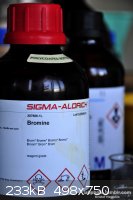
[Edited on 10-4-2012 by kristofvagyok]
I have a blog where I post my pictures from my work: http://labphoto.tumblr.com/
-Pictures from chemistry, check it out(:
"You can’t become a chemist and expect to live forever." |
|
|
inspector071
Hazard to Self
 
Posts: 69
Registered: 20-2-2012
Member Is Offline
Mood: No Mood
|
|
Quite so, and the pictures you have posted are fantastic! I checked out the ones on your tumblr too. Really makes me want to invest in a nice DSLR to
take pretty pictures with. For now, my iPhone + microscope will have to suffice.
|
|
|
White Yeti
National Hazard
   
Posts: 816
Registered: 20-7-2011
Location: Asperger's spectrum
Member Is Offline
Mood: delocalized
|
|
Quote: Originally posted by Endimion17  | | I've never read any remotely solid argument on why did bromine get that incredibly stupid name. Either something's wrong with my olfactory nerve
and/or brain, or the one from the guy proposing the name. |
Smell can be subjective to a certain extent (although I think everyone will agree that H2S and mercaptans smell abominable). Maybe the scientist who
first isolated it had an acute sense of smell...
Stupid things like that happen sometimes. Example: Fahrenheit wanted to base his temperature scale on human body temperature (100F = normal human body
temperature), but he probably had a cold that day because normal body temperature is 98F 
To give another example, we based all our formulas for electricity on the wrong charge. Now we have the conventional/true current ambiguity.
"Ja, Kalzium, das ist alles!" -Otto Loewi
|
|
|
ItalianChemist
Hazard to Others
  
Posts: 175
Registered: 26-1-2011
Location: Italy
Member Is Offline
Mood: No Mood
|
|
I like very much smell of H2S!
Bromine is like Cl2! I like it because it isn't as stifling as Cl2 smell!
|
|
|
dann2
International Hazard
    
Posts: 1523
Registered: 31-1-2007
Member Is Offline
Mood: No Mood
|
|
Quote: Originally posted by kristofvagyok  |
...........
The main problem with the bromine is to pour it out from the bottle and weight it, because of the fumes what comes out from it, smells really bad and
causes not so good things. The positive thing is the fume hood helps a lot(:.........
[Edited on 10-4-2012 by kristofvagyok] |
When pouring a liquid from a bottle to another container a trick that usually works nicely it to obtain a glass rod and hold it against the opening of
the bottle and use it to guide the liquid into the other container. Liquids usually 'jump' to the rod as opposed to dribbling down where you do not
want them to dribble.
When pouring Bromine from one bottle to another the glass rod trick will NOT work. The Bromine refused to jump to the rod. In fact it's as if the rod
repells the Bromine. A mess when you have no fume hood.
|
|
|
White Yeti
National Hazard
   
Posts: 816
Registered: 20-7-2011
Location: Asperger's spectrum
Member Is Offline
Mood: delocalized
|
|
Quote: Originally posted by dann2  |
When pouring Bromine from one bottle to another the glass rod trick will NOT work. The Bromine refused to jump to the rod. In fact it's as if the rod
repells the Bromine. A mess when you have no fume hood. |
I'm sorry to be brusque, but DUH! Bromine does not adhere to glass the same way as other liquids (polar liquids notably). I haven't worked with
bromine or benzene, but I'm willing to bet that benzene will not trickle down a glass rod either because of its polarity, or lack thereof.
"Ja, Kalzium, das ist alles!" -Otto Loewi
|
|
|
Mailinmypocket
International Hazard
    
Posts: 1351
Registered: 12-5-2011
Member Is Offline
Mood: No Mood
|
|
Quote: Originally posted by Mailinmypocket  | Thanks! That was my first try, Ive seen that video many times too while trying to figure out the ideal mix. Maybe more concentrated ferroin and/or a
catalyst... I didn't add any Ce or Mn, time to tweak the formula! I am going to try with a methyl orange formulation... Hopefully it is as good if not
better
[Edited on 10-4-2012 by Mailinmypocket] |
Tried the Belousov-Zhabotinsky again, this time by adding methyl orange along with ferroin to the mixture. The waves were much more pronounced and
more frequent and organized. The first time the petri dish more or less went through a rapid color change, this time it was a slow creeping wave
formation that repeated itself every 15 seconds or so.
This is a fun reaction to do and try modifying the concentrations on different reagent and time/monitor the effect of the changes.
This is the latest try with methyl orange:
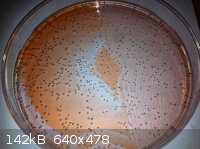
[Edited on 11-4-2012 by Mailinmypocket]
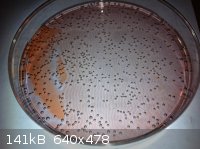
|
|
|
RonPaul2012
Hazard to Self
 
Posts: 89
Registered: 29-2-2012
Member Is Offline
Mood: No Mood
|
|
I have wanted to contribute to this forum in some way for quite some time.
Here are some pictures I took of a flaming boric acid denatured ethanol mix.
Enjoy 
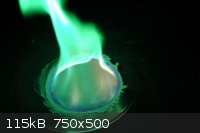 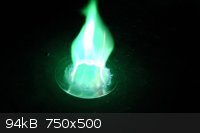
|
|
|
kristofvagyok
National Hazard
   
Posts: 659
Registered: 6-4-2012
Location: Europe
Member Is Offline
Mood: No Mood
|
|
When I made the same experiment and the ethanol was with high excess (95% EtOH and just 5% MeOH) the flame was mainly yellow and had just a slight
green tint, just with pure MeOH was a really green flame produced. But these results are fantastic! Congrats!
Quote: Originally posted by White Yeti  |
I'm sorry to be brusque, but DUH! Bromine does not adhere to glass the same way as other liquids (polar liquids notably). I haven't worked with
bromine or benzene, but I'm willing to bet that benzene will not trickle down a glass rod either because of its polarity, or lack thereof.
|
Today I tried our with some benzene and it didn't "tricked" down the glass rod. And I won't try it our with bromine, ok?
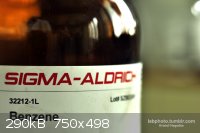
I have a blog where I post my pictures from my work: http://labphoto.tumblr.com/
-Pictures from chemistry, check it out(:
"You can’t become a chemist and expect to live forever." |
|
|
ItalianChemist
Hazard to Others
  
Posts: 175
Registered: 26-1-2011
Location: Italy
Member Is Offline
Mood: No Mood
|
|
Hi!
I've made this nice compound mixing FeCl2, 2,2'-Bipyridine and NaBF4
I think that this is Fe[bipy]3(BF4)2, but I'm not sure
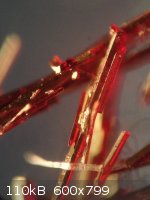
|
|
|
Mailinmypocket
International Hazard
    
Posts: 1351
Registered: 12-5-2011
Member Is Offline
Mood: No Mood
|
|
Nice job! It's so satisfying to see big crystals in the bottom of your vessel/filter paper etc! I'm not certain of what compound you made either but
it looks cool 
|
|
|
RonPaul2012
Hazard to Self
 
Posts: 89
Registered: 29-2-2012
Member Is Offline
Mood: No Mood
|
|
Quote: Originally posted by kristofvagyok  |
When I made the same experiment and the ethanol was with high excess (95% EtOH and just 5% MeOH) the flame was mainly yellow and had just a slight
green tint, just with pure MeOH was a really green flame produced. But these results are fantastic! Congrats!
Quote: Originally posted by White Yeti  |
I'm sorry to be brusque, but DUH! Bromine does not adhere to glass the same way as other liquids (polar liquids notably). I haven't worked with
bromine or benzene, but I'm willing to bet that benzene will not trickle down a glass rod either because of its polarity, or lack thereof.
|
Today I tried our with some benzene and it didn't "tricked" down the glass rod. And I won't try it our with bromine, ok?
|
Thanks , I'm glad you liked it 
|
|
|
ItalianChemist
Hazard to Others
  
Posts: 175
Registered: 26-1-2011
Location: Italy
Member Is Offline
Mood: No Mood
|
|
Quote: Originally posted by Mailinmypocket  |
Nice job! It's so satisfying to see big crystals in the bottom of your vessel/filter paper etc! I'm not certain of what compound you made either but
it looks cool  |
Thank you!
They aren't very big, in the photo they are enlarged!
|
|
|
Endimion17
International Hazard
    
Posts: 1468
Registered: 17-7-2011
Location: shores of a solar sea
Member Is Offline
Mood: speeding through time at the rate of 1 second per second
|
|
This is not something I've exactly made, but it's a chemical compound nonetheless, and it's pretty.

link to all sizes
It's vanadinite, Pb<sub>5</sub>(VO<sub>4</sub> <sub>3</sub>Cl. <sub>3</sub>Cl.
Although it does look somewhat edited, it really does look like this in strong sunlight. The back of the crystals have an opaque deposit, so the light
is reflected a lot more.
|
|
|
Squall181
Harmless

Posts: 46
Registered: 21-2-2011
Member Is Offline
Mood: No Mood
|
|
Thanks Endimion that's a beautiful picture and worthy of being my desktop background
|
|
|
dann2
International Hazard
    
Posts: 1523
Registered: 31-1-2007
Member Is Offline
Mood: No Mood
|
|
Quote: Originally posted by White Yet  |
I'm sorry to be brusque, but DUH! Bromine does not adhere to glass the same way as other liquids (polar liquids notably). I haven't worked with
bromine or benzene, but I'm willing to bet that benzene will not trickle down a glass rod either because of its polarity, or lack thereof.
|
The 'rod trick' can be very useful when transferring liquids.
Benzene runs down a rod OK.
Perhaps the very dense Br has very high surface tension, like Hg. It's as if the glass rod repells it.
|
|
|
plastics
Hazard to Others
  
Posts: 141
Registered: 6-11-2009
Member Is Offline
Mood: No Mood
|
|
A solution of perylene in acetone fluorescing under UV light on a watch glass, and some acting as a fluorophore in a bottle demonstrating
chemisluminescence with TCPO.
Credit to garage chemist for pointing me to a synthesis of perylene starting from 2-naphthol on versuchschemie.de
The chemiluminescence was so intense it could be seen in daylight
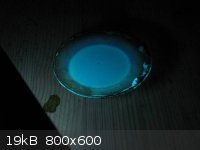 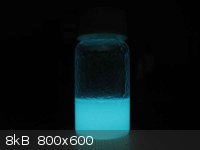
|
|
|
garage chemist
chemical wizard
    
Posts: 1803
Registered: 16-8-2004
Location: Germany
Member Is Offline
Mood: No Mood
|
|
Hey plastics, didn't you want to describe how you made the 2,4,6-trichlorophenol? Doesn't have to be a detailed procedure, just tell me how you did
it, and how you determined that the product was the desired substance and whether it was pure.
|
|
|
Dennis SK
Harmless

Posts: 21
Registered: 12-3-2012
Member Is Offline
Mood: No Mood
|
|
High purity 99,999%+ Niobium metal crystals 

|
|
|
nyll
Harmless

Posts: 7
Registered: 20-4-2012
Member Is Offline
Mood: No Mood
|
|
Quote: Originally posted by Endimion17  | This is not something I've exactly made, but it's a chemical compound nonetheless, and it's pretty.

link to all sizes
It's vanadinite, Pb<sub>5</sub>(VO<sub>4</sub> <sub>3</sub>Cl. <sub>3</sub>Cl.
Although it does look somewhat edited, it really does look like this in strong sunlight. The back of the crystals have an opaque deposit, so the light
is reflected a lot more. |
Looks photoshoped, but great still. 
|
|
|
dann2
International Hazard
    
Posts: 1523
Registered: 31-1-2007
Member Is Offline
Mood: No Mood
|
|
@Dessik SK
It the Nb you own, did you grow them yourself?
|
|
|
Dennis SK
Harmless

Posts: 21
Registered: 12-3-2012
Member Is Offline
Mood: No Mood
|
|
Hello.
Yes It's from my collection.
No, It was made in Russia many years ago. I dont think this type of Niobium is made anymore.
|
|
|
barley81
Hazard to Others
  
Posts: 481
Registered: 9-5-2011
Member Is Offline
Mood: No Mood
|
|
Iodine ingot made by melting iodine under concentrated sulfuric acid. Credit goes to woelen for suggesting this.
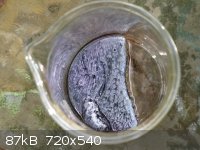
Suspended iodine.
[Edited on 26-4-2012 by barley81]
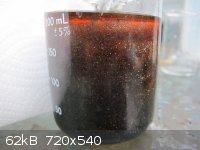
|
|
|
| Pages:
1
..
13
14
15
16
17
..
40 |